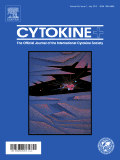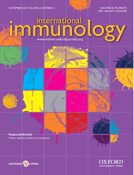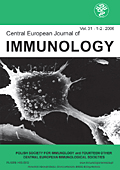
European Journal of Inflammation
Scope & Guideline
Advancing knowledge in immunology and inflammation.
Introduction
Aims and Scopes
- Mechanisms of Inflammation:
The journal publishes research that elucidates the cellular and molecular mechanisms underlying inflammation, including studies on cytokines, chemokines, and immune cell interactions. - Clinical Implications of Inflammation:
Research focusing on the clinical consequences of inflammatory processes in diseases such as autoimmune disorders, infections, and cancer is a core area, providing insights that can influence treatment strategies. - Biomarkers and Diagnostics:
Papers often investigate potential biomarkers for inflammation-related diseases, enhancing diagnostic capabilities and prognostic assessments. - Therapeutic Approaches:
The journal highlights innovative therapeutic strategies targeting inflammatory pathways, including pharmacological interventions and novel treatments. - Cross-disciplinary Studies:
Research that integrates fields such as immunology, oncology, cardiology, and pulmonology, reflecting the interdisciplinary nature of inflammation research.
Trending and Emerging
- COVID-19 and Inflammation:
With the ongoing impact of the COVID-19 pandemic, studies examining the inflammatory responses associated with the virus and its long-term effects are trending, highlighting the urgent need for understanding virus-induced inflammation. - Inflammation and Metabolic Disorders:
Research linking inflammation with metabolic conditions, such as diabetes and obesity, is gaining traction, indicating a growing recognition of the interplay between metabolic health and inflammatory processes. - Immunotherapy and Inflammation:
There is a rising interest in the role of inflammation in immunotherapy, particularly in cancer treatment, showcasing the relevance of inflammatory pathways in enhancing therapeutic efficacy. - Inflammation in Neurological Disorders:
Investigations into the role of inflammation in neurological conditions, including Alzheimer’s disease and multiple sclerosis, are emerging as a significant area of research, reflecting a broader interest in neuroinflammation. - Microbiome and Inflammation:
The relationship between the microbiome and inflammatory responses is increasingly highlighted, suggesting a complex interplay that could offer new therapeutic targets.
Declining or Waning
- Chronic Inflammatory Diseases:
Research specifically focused on chronic inflammatory diseases such as rheumatoid arthritis and lupus has seen a decrease, possibly due to saturation in the field or a shift towards more acute inflammatory responses. - Traditional Pharmacological Approaches:
There is a noted reduction in studies solely focused on established pharmacological treatments for inflammation, indicating a transition towards exploring novel therapeutic avenues. - Basic Science of Inflammation:
Basic science studies that do not translate into clinical implications are becoming less frequent, suggesting a preference for research with direct clinical relevance.
Similar Journals

CYTOKINE
Exploring the intricate roles of cytokines in health and disease.CYTOKINE is a prestigious peer-reviewed journal published by Academic Press Ltd - Elsevier Science Ltd, dedicated to advancing the field of immunology, biochemistry, and related biomedical sciences since its inception in 1989. With an ISSN of 1043-4666 and an E-ISSN of 1096-0023, this journal serves as a vital resource for researchers and professionals alike, offering cutting-edge research findings that delve into the roles and mechanisms of cytokines in health and disease. Recognized for its impactful contributions, CYTOKINE currently ranks in the Q2 quartile across several categories, including Biochemistry, Hematology, and Immunology, indicating its significant influence in these fields. Despite not offering open access, the journal maintains a high-quality standard, as evidenced by its robust Scopus rankings, including a notable 80th percentile in Medicine and Hematology. Researchers and students are encouraged to explore the latest findings and methodologies via CYTOKINE, as it continues to shape the future landscape of cytokine research and application.

Inflammation and Regeneration
Pioneering research at the intersection of inflammation and healing.Inflammation and Regeneration is a prominent open-access journal published by BMC, focused on the discerning fields of immunology, cell biology, and regenerative medicine. Since its establishment in 2016, the journal has provided a platform for the dissemination of high-quality research, contributing significantly to the advancement of knowledge in inflammation processes and regenerative therapies. With a remarkable impact reflected in its Q1 quartile rankings in Cell Biology and Immunology for 2023, Inflammation and Regeneration stands out as a leading resource for researchers and practitioners. The journal's commitment to open access ensures that critical findings are readily available to a global audience, fostering collaboration and innovation in the scientific community. With a Scopus ranking that places it in the top 20% of its categories, Inflammation and Regeneration serves as an essential reference for those seeking to stay at the forefront of immunological research and its applications.

INTERNATIONAL IMMUNOLOGY
Advancing Immunological Insights for a Healthier Tomorrow.INTERNATIONAL IMMUNOLOGY, published by OXFORD UNIV PRESS, stands out as a premier journal in the field of immunology, providing a vital platform for disseminating groundbreaking research and innovative developments within the discipline. With an impressive Q1 ranking in Immunology and Allergy, as well as in Medicine (miscellaneous), it consistently showcases high-impact studies that contribute to the advancement of immunological knowledge. The journal spans over three decades, from its inception in 1989 to its ongoing contributions as of 2024, thus solidifying its reputation in the scientific community. Researchers, professionals, and students will find valuable articles that delve into the complexities of immune responses, therapeutic interventions, and emerging immunological paradigms, ensuring INTERNATIONAL IMMUNOLOGY remains at the forefront of knowledge in the life sciences.

NATURE IMMUNOLOGY
Elevating the discourse on immune responses and disease.NATURE IMMUNOLOGY is a premier academic journal published by NATURE PORTFOLIO, dedicated to advancing the field of immunology. With an impressive impact factor that reflects its esteemed position, this journal ranks in the top quartile (Q1) of renowned categories, including Immunology and Allergy. Serving as a crucial platform for researchers, professionals, and students, NATURE IMMUNOLOGY showcases cutting-edge research, comprehensive reviews, and insightful perspectives that drive innovation in immunological science. Based in the United Kingdom, this journal has been a vital contributor to the global discourse on immune responses and related diseases since its inception in 2000. Researchers can benefit from its rigorous peer-review process, ensuring that only high-quality studies are disseminated, thus enhancing their academic pursuits and practical applications. Explore the latest findings and trends within this flourishing discipline, making NATURE IMMUNOLOGY an essential resource for anyone engaged in the study of the immune system.

OCULAR IMMUNOLOGY AND INFLAMMATION
Empowering clinicians with essential ocular insights.Ocular Immunology and Inflammation is a distinguished academic journal dedicated to advancing the field of ocular immunology and ophthalmic inflammation. Published by Taylor & Francis Inc, this journal plays a crucial role in disseminating high-quality research findings, reviews, and clinical studies that address the complexities of immune responses in the eye and their implications in various ocular diseases. With an impressive impact factor and consistently ranking in the Q2 category in both Immunology and Allergy and Ophthalmology, it stands out as a vital resource for researchers, clinicians, and students alike. The journal's broad scope encompasses both experimental and clinical studies, ensuring a comprehensive exploration of the mechanisms and treatments of ocular inflammatory conditions. With its publication history dating from 1993 to 2024, this journal continues to be an essential reference for those seeking cutting-edge research and insights into ocular health. Researchers and professionals are encouraged to engage with the latest articles to inform their practice and advance their knowledge in this critical area of medicine.

Journal of Asthma and Allergy
Empowering the global dialogue on asthma and allergy.The Journal of Asthma and Allergy, published by DOVE MEDICAL PRESS LTD, is a leading open-access journal dedicated to advancing research in the fields of immunology, allergy, and pulmonary medicine. Since its inception in 2008, this journal has provided a vital platform for disseminating high-quality, peer-reviewed research that explores the complexities of asthma and allergy, allowing researchers, professionals, and students to access critical insights without subscription barriers. With an impressive impact factor reflected in its 2023 quartile rankings (Q2) in both Immunology and Allergy, as well as Pulmonary and Respiratory Medicine, the journal stands as a significant contributor to the scientific community, promoting innovative findings that support clinical practice and patient care. Based in New Zealand, the Journal of Asthma and Allergy continues to be at the forefront of research, from its dedication to publishing cutting-edge studies to fostering an inclusive academic discourse that spans the globe. Access to relevant articles is available online, ensuring that all stakeholders in these fields can stay informed and engaged.

FASEB JOURNAL
Fostering Collaboration in Cutting-Edge ResearchFASEB JOURNAL, published by Wiley, stands as a leading interdisciplinary platform in the realm of biological sciences, prominently featured in the United States. With an impressive 2023 impact factor placing it in the Q1 category across various fields including Biochemistry, Biotechnology, Genetics, Molecular Biology, and Medicine (miscellaneous), the journal is recognized for its substantial contribution to advancing knowledge and innovation. It serves as a vital resource for researchers, professionals, and students alike, providing high-quality, peer-reviewed articles that explore the molecular and cellular mechanisms underlying health and disease. The FASEB JOURNAL not only emphasizes accessible scientific communication but also fosters collaboration within these dynamic fields, making it an essential publication for anyone engaged in cutting-edge life sciences research. To explore more about the journal's offerings and access its vast repository of scholarly articles, visit their official page.

Journal of Inflammation-London
Connecting Researchers to Transform Inflammation KnowledgeJournal of Inflammation-London, published by BMC, is a premier open access journal dedicated to advancing the understanding of inflammation, a critical process underlying numerous diseases including autoimmune disorders, cancer, and cardiovascular conditions. With its inception in 2004, the journal has consistently delivered high-quality research that bridges basic science and clinical applications, maintaining a significant place in the academic community. It holds impressive rankings within the Q2 category for both Cell Biology and Clinical Biochemistry, reflecting its impactful contributions to these fields, where it ranks in the 73rd and 64th percentiles respectively. The journal is committed to open access principles, ensuring that all published articles are freely available to researchers, practitioners, and the global community, thereby fostering collaboration and innovation. Located in the United Kingdom, the journal continues to attract submissions from prominent researchers and institutions worldwide, solidifying its status as an essential resource for the latest developments in inflammation research.

Central European Journal of Immunology
Connecting Global Minds in ImmunologyCentral European Journal of Immunology is a premier publication dedicated to advancing the field of immunology and allergy research. Established in 1996 and published by TERMEDIA PUBLISHING HOUSE LTD, this open access journal has consistently provided a platform for innovative research and comprehensive reviews since its transition to open access in 2002. With an ISSN of 1426-3912 and E-ISSN of 1644-4124, it embraces a global readership while being rooted in Poland. The journal, with a notable Q3 ranking in both the categories of immunology and allergy in 2023, positions itself within the competitive landscape of scientific discourse, as reflected in its Scopus rankings. Designed for researchers, professionals, and students, the Central European Journal of Immunology not only disseminates significant findings but also fosters collaboration and innovation in the immunological sciences, making it a vital resource for those seeking to stay current in this rapidly evolving field.

Journal of Translational Medicine
Empowering Innovation in Biomedical Research.Journal of Translational Medicine, published by BMC in the United Kingdom, stands at the forefront of biomedical research, bridging the gap between laboratory discoveries and clinical applications. Established in 2003 as an Open Access journal, it has garnered significant recognition, achieving a Q1 quartile ranking in both Biochemistry, Genetics and Molecular Biology and Medicine categories as of 2023. With an impressive Scopus rank of 38 out of 636 in General Medicine and 33 out of 221 in General Biochemistry, Genetics and Molecular Biology, the journal is committed to disseminating high-quality, peer-reviewed research that impacts healthcare and informs clinical practices. By facilitating free access to groundbreaking studies, the Journal of Translational Medicine aims to enhance collaboration among researchers, professionals, and students in the scientific community, fostering advancements in translational research well into the future.